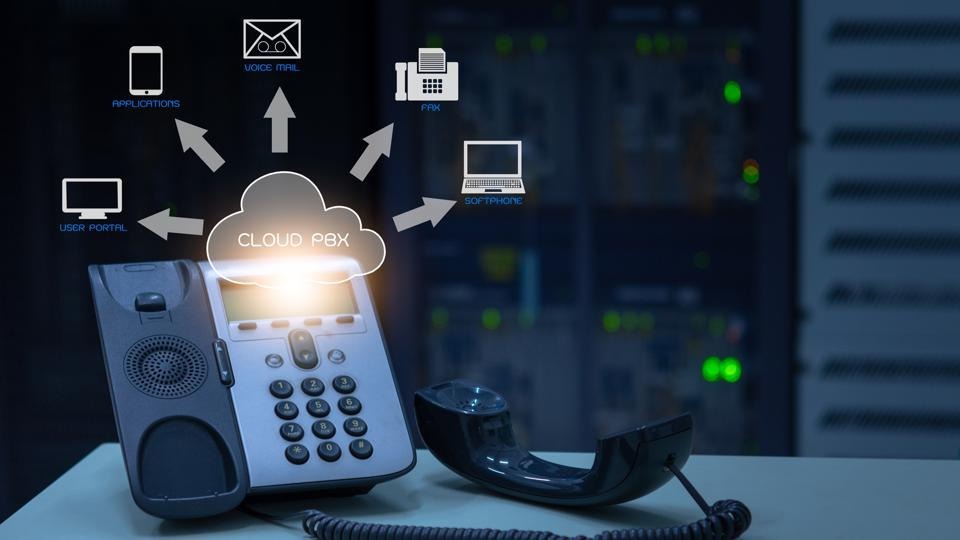Cloud phone service has several advantages over traditional landline phones and on-premise PBX systems, including enhanced call-handling functionality, cost-effectiveness, and customizable contracts. In this piece, we examine and investigate the best cloud phone service available today. We have summarized our findings on price and plans, features and customer service, network reliability, and other topics to assist you in finding the best choice.
Contents
What is a cloud phone service?
A cloud phone service is housed in the cloud, which means that data is saved on a secure server accessible over the internet. A cloud phone system, which typically replaces traditional landlines, is hosted by a third-party service provider such as Grasshopper.

A cloud-based phone system does not necessitate on-premises hardware or regular maintenance. Instead of an answering machine tape, phone bills, and a tangle of wires, a cloud phone system stores data digitally and receives calls over the internet.
Cloud phone systems can be accessible by any internet-enabled device, including computers and smartphones, and require only a broadband internet connection to operate. They are less expensive and easier to use, which helps to improve business operations.
Cloud Phone service Benefits
Cloud phone systems are less expensive
One of the most significant advantages of cloud phone systems is the significant cost reductions when compared to regular phone services. Cloud communications minimize the need to pay for large and costly installations up front. Not to mention the ongoing maintenance costs of a typical phone system.
When you host your phone system over the Internet, you will only be paid based on usage. You just pay for the amount of hostage space and bandwidth that you require. Cloud phone systems also provide free or low-cost access to advanced features and upgrades. Commonly, predetermined monthly prices per phone line, or ‘seats’, are offered by cloud phone providers.
Cloud-based phone systems have numerous benefits
Cloud-based phone systems offer a wide range of common services, as well as voicemail, enhanced email and automatic attendants, and a plethora of other unified communications options. Some more advanced functions include traffic shaping, such as MPLS, which is important for bandwidth preservation. It also contributes to call quality and reliability.
Some providers, such as Fastmetrics, offer cloud voice on privately managed networks, ensuring that voice traffic is never routed over the public Internet. Cloud phones can also connect to two separate on-site Internet circuits, which is important for backup purposes.
Cloud-based business phone systems are adaptable
Cloud phone systems provide organizations with access to the most recent voice features without the need for hardware updates. Whether your company is expanding or contracting, a cloud service will give the flexibility it requires today and in the future.
Cloud-based Services Can Be Scaled Easily

Scalability is the goal of any firm. Their phone system should as well. Anyone who has had to extend or relocate an on-premise phone system understands the effort involved. There was a lot of equipment, a lot of manpower, and a lot of careful shifting of huge hardware. A cloud phone system is simple and quick to set up. The only things that need to be moved are phones or wires, which puts no additional strain on your company’s IT department.
Mobility Apps & Remote Work in the Cloud
What business nowadays does not require constant communication? Businesses with off-site workforces and remote employees benefit and are empowered by a cloud phone system. Cloud-hosted technologies enable communication with all coworkers and customers, regardless of their location.
Using a Cloud Telephony System for Disaster Recovery
Your company’s phone system should never fail. Ever. It must be operational 24 hours a day, seven days a week to service your clients and receive inbound sales, leads, or new business. A cloud phone system protects against the loss of company voice in the event of a disaster. Using the cloud offers consistent and dependable phone service.
How can you tell if your company requires a cloud phone service?
Cloud-based phone systems are lighter and less expensive than more expensive traditional phone systems, but they may not be appropriate for every organization. Consider the following aspects when deciding whether to purchase a cloud-based company phone system.
Cloud phone systems are a terrific option if you’re starting from scratch and want to reduce your equipment to a minimum. Cloud phones run entirely on a desktop computer or mobile device, with no need for additional hardware. If you have a lot of traditional phone system equipment that you don’t want to throw away, be sure it’s compatible with current cloud systems before signing up with a provider.

Costs: Unlike many traditional phone systems, cloud phone systems do not require installation or upkeep. Some cloud-based phone systems, on the other hand, provide access to a wide range of capabilities, such as video conferencing and AI sentiment analysis. However, you will have to pay for these extra bells and whistles, so think carefully before purchasing. Some cloud phone companies provide scaled-down versions that may be better appropriate for a business that only requires basic phone services.
Reliability: Cloud-based phone services rely on a steady and stable internet connection. If your connection is unreliable, a cloud phone system may be ineffective unless you first increase your internet plan.
Data management: When using any type of cloud service provider, data is kept and handled by a third party rather than on local servers. This can be advantageous for small organizations without specialized IT resources, but it can be disadvantageous for those that desire complete control over their data. Think about how your company uses data and the security procedures of any service you choose to partner with.
